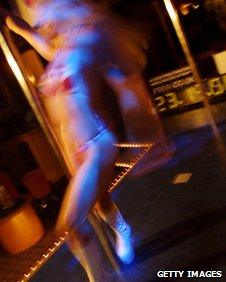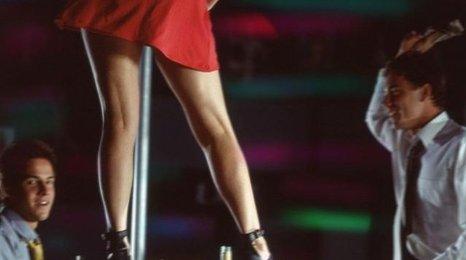New powers to shut lap dancing clubs
- Published

Many lap dancers say they're worried about being labelled "sex workers"
From this week councils in England have had more powers to close down lap dancing clubs.
It's due to a change in the law which means they now need to apply for a new "sex establishment licence".
Previously the clubs were put in the same category as cafes and bars, meaning they could only be stopped from opening if they attracted crime, were a nuisance or endangered the public.
Clubs have 12 months to get one.
Chris Knight from the Lap Dancing Association says clubs are worried their applications will be refused or they won't be able to afford them.
He said: "The cost of one of these licences can be anything from £3,000 to £30,000 a year.
"The industry, and also country, is not in a great financial situation at the moment and so the last thing we need is extra costs pushed upon us."
'Sleazy image'
The law was brought in after protests from people saying they didn't want lap dancing clubs opening in their area.
Similar rules will be introduced in Wales and Northern Ireland at a later date. Restrictions are already in place in Scotland.
Since 2004 it's estimated the number of lap dancing clubs has doubled to more than 300 across the UK but town halls and residents groups wanted greater powers to restrict them.
Councils now have the authority to stop a club from opening if it's near a school or church, for example, or in a quiet neighbourhood.
They also have more say as to how many there are in an area.
One resident Newsbeat talked to in Northampton said: "I think the new law is good. I wouldn't want one around the corner from where I live and I wouldn't like one where my kids would be either just because of their sleazy image."
Clubs on the other hand are worried the changes will mean job losses and less investment in the industry, which is worth more than £2 billion a year.
'Labelled'
Lap dancer Crystal (not her real name) fears it will affect many girls.
"I think it'll have a big impact on a lot of girls," she said. "There are thousands and thousands of dancers across the UK and they're all going to be unemployed."
Club owners are also worried that dancers will be pushed towards unregulated clubs if faced with the sack.
Crystal's main concern is that the new "sex establishment licence" will label her as something she's not.
"I absolutely don't want to be labelled as a sex worker," she said. "I am a dancer, it goes nothing more than that.
"It isn't possible for it to go more than that, there's no such thing as extras.
"A lot of people misunderstand it and think that we're already a part of the sex industry but we're definitely not. Dancers don't offer sex. That's why they're dancers."
- Published12 February 2010

- Published14 September 2009
- Published5 August 2009